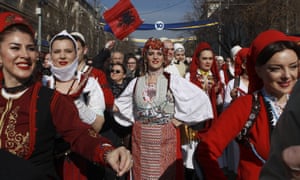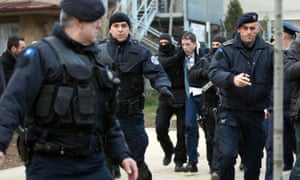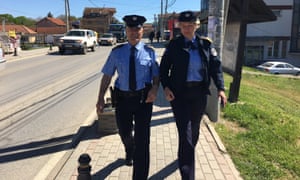Kosovo’s bitter enemies look to heal old wounds

In a picturesque village in northern Kosovo, Marko Đurić swigged from a bottle of Gazimestan beer and smiled for the cameras. On a visit to the area a few weeks previously, Đurić had been arrested by special forces, bundled into a police van, and unceremoniously deported. This time, Serbia’s point man for Kosovo issues was allowed to stay, albeit with a helicopter hovering noisily overhead to keep watch.
Đurić was in Kosovo, which Serbia still officially regards as its province, to tour a microbrewery producing beer named in honour of a medieval battle which is key to Serbia’s emotional attachment to Kosovo. He also visited a spa resort, under construction to cater to Serbian pilgrims to the 14th-century Banjska monastery.
“It is my duty to be here and to stand proudly with our people,” said Đurić to the gathered throng of television crews. “I invite all Serbian citizens to come here without prejudice, and experience their holy sites here in Kosovo and Metohija,” he said, using the Serbian name for the province.
Nearly two decades after Serb forces withdrew from Kosovo in 1999 after a Nato air campaign against Slobodan Milošević, and a decade after Kosovo declared independence, the country’s most sensitive issue is the fate of its remaining Serb residents, and the political status of the areas where they live. Reprisals by Kosovo Albanian guerrillasafter Milošević’s crackdown on the Albanian population in the 1990s, followed by independence, led to a steady outflow of Serbs, and they now make up around 5% of Kosovo’s 1.8 million population.
Under an agreement signed in Brussels in 2013, the Kosovo government was supposed to set up a so-called Association of Serbian Municipalities, which would bring Serb-majority areas into its system but would also give them a collective voice. Belgrade and Pristina are still jostling over the final format, as they edge towards a comprehensive deal to normalise relations and potentially usher in an EU future for both.

Avni Arifi, chief of staff to Kosovo’s prime minister, said cultural guarantees and political representation for Serbs were already enshrined in its constitution, and he accused Belgrade of wanting to create a Trojan horse, akin to Republika Srpska, the increasingly autonomous Serb entity inside Bosnia. “They’re asking for us to give something more, but forgiveness is all they can get because everything else is taken,” said Arifi.
Serbia’s president Aleksandar Vučić last week claimed that Kosovo had done “zero potato” to implement any of its promises. Vučić has been working the diplomatic circuit, trying to drum up support for concessions to Serbia, the details of which still remain vague, as well as prepare public opinion at home for potentially painful compromises.
Kosovo’s president Hashim Thaçi has ruled this option out. “There will be no division of Kosovo. There will be no exchange of territory,” he has said. Western diplomats are also strongly opposed, at least in part because of the precedent it could set for other disputed borders in the Balkans.
Additionally, many Serbs live in enclaves south of the river, such as Gračanica, just a few miles outside Pristina. A vast photograph of Vučić dominates the main square, where Serbian flags fly. Serbian dinars are accepted, as well as euros, the official currency. Gračanica’s Orthodox monastery, completed in 1321, is filled with frescos of biblical scenes, most notably a rendering of the Last Judgment complete with burning sinners. It is Kosovo’s medieval monasteries which create the emotional draw for many Serbs, who see it as the heart of their nation and religion.
Here, the police force offers a rare glimmer of hope for those who would like to see an integrated, multi-ethnic Kosovo. Of the officers based at Gračanica’s station, 41 are Serbs and 12 are Albanian. Svetlana Kapetanović, a 43-year-old ethnic Serb policewoman who speaks fluent Albanian, said that in recent years ethnically motivated incidents have been extremely rare, with most of the force’s work hours dedicated to fighting petty crime. The officers all wear uniforms emblazoned with the Kosovo flag, at odds with the Serbian flags around the town.
Kapetanović said she decided to learn Albanian after an incident at the beginning of her police career in 2003, when she was called with a group of Albanian officers to a domestic violence incident involving a young Albanian woman.
“I was the only female officer there, and the girl was giving me looks, like she wanted to communicate something to me without saying it to the men. I could see she wanted help from me and I wanted to talk to her but I couldn’t speak Albanian and she couldn’t speak Serbian. I suspected there had been a rape, and reported it to my commander. Later, it turned out I had been right. It was then I realised that I needed to learn Albanian.”

As a fluent Albanian speaker, Kapetanović is a rare Serb. While there is still a generation of Kosovo Albanians who remember Serbian, among the youth crossover it is rare. Children at Serbian-language schools, which still run on the Serbian state curriculum, learn no Albanian, and vice versa.
“Unfortunately we still have a situation where Serbs and Albanians live separate lives,” said Dalibor Jevtić, the Serb deputy prime minister, who speaks Albanian. While dodging the issue of his own views on Kosovo’s status, Jevtić said all sides need to take a constructive approach to the language issue. Although his party, Serbian List, has strong links to Belgrade, he said it was not for Serbia to tell Kosovo Serbs how to live.
“Ninety per cent of Serbs in central Serbia have never been to Kosovo. They don’t understand our lives and I don’t take it very seriously when they tell me how I should live my life with my neighbours,” he said.
Although most Kosovo Serbs are still uneasy at the idea of independence, many now see unemployment and economic disenfranchisement as bigger threats than ethnic tensions. There are also divides within the community, starkly illustrated by the assassination in January of Oliver Ivanović, a Kosovo Serb politician who opposed Serbian List, which dominates the Serb political scene. Ivanović was shot dead in Mitrovica, split into Serbian and Albanian sides by the Ibar. Nobody has been arrested for the murder.
“It’s not safe to speak freely in this town, but let’s just say it wasn’t Albanians who killed him,” said Marko Jakšić, a political associate of Ivanović, during an interview in North Mitrovica.
Some Kosovo Serbs say Belgrade and Pristina are equally frustrating in using their predicament to score points. The high-profile Kosovo visits of Đuric and others often seem aimed at public opinion in Serbia rather than making material improvements for them. “For Belgrade, Kosovo is just a poker chip to be played on the path to Serbia’s EU integration,” said Jakšić. “Vučić is willing to play it, and Đuric is just meant to be the sedative that makes things easier for us.”
Additional reporting by Una Hajdari
